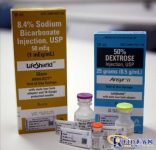
North Carolina hospital adopts RFID technology to improve the efficiency of drug recall inspections
[ad_1]
After CaroMont Hospital adopted the UHF RFID solution provided by Kit Check, the time for staff to organize medicines was reduced from more than 20 hours to 2 hours.
The US Food and Drug Administration recalls 350-375 drugs each year on average, and this number is currently on the rise. Every time the FDA releases drug recall information, the hospital must conduct drug inspections to ensure that the recalled drugs will not be distributed to patients. In many cases, medicines are stored in emergency medicine carts, and the seals need to be opened for inspection. After inspection, they are sealed and put back in the cart.

In May of this year, after the hospital installed the RFID solution provided by Kit Check, it saved a lot of manual inspection time. The solution includes Zebra printers, passive UHFReader(Embedded in the scanning box), UHF EPC RIFD label. After the solution is installed, through the Kit Check software, users can clearly understand whether the package of drugs contains recalled drugs, so as to quickly respond to drug recall actions.
CaroMont Hospital has a total of 435 beds, 96 emergency medicine carts and complete medicine kits containing 20-50 medicines.
With the Kit Check solution, hospital employees first scan the barcode on the medicine, and then print the EPC UHF RFID label on the medicine through the Zebra R110 xi4 label printer. The relevant drug data is stored in the Kit Check database in the company’s backend. At the same time, the printer codes and prints labels for the whole set of medicines, and the labels record the types of the whole set of medicines, such as medicines for the treatment of male stroke.
The medicine scanning box provided by Kit Check has embeddedRFIDReader. After the medicine is packaged in a complete set, put it into the box, the reader reads the medicine label, and sends the read label information to the background data software through a wired connection. According to the read tag data, the Kit Check software determines whether the combination of medicines meets the requirements. If the combination of medicines is wrong, the system will issue an alarm.

The entire drug inspection process only takes 5 minutes, which greatly reduces the working time compared with the previous manual inspection (which takes 20 minutes).
If there are medicines that need to be recalled, the staff only need to enter the batch number of the medicines into the Kit Check software to find the complete package and emergency medicine cart where the medicines are located, which greatly facilitates the staff to collect the recalled medicines.
Before installing the RFID system, the drug recall inspection process is complicated and usually takes 20-30 hours; after the system is installed, the same inspection process can be completed in about 2 hours.
After adopting this solution, the replenishment efficiency of the whole set of medicines is also improved. Moreover, the inspection of expired drugs can be facilitated.
So far, CaroMont Hospital has attached Kit Check UHF RFID tags to its 15,000 medicines. The label can still maintain high readability in high-density environments such as liquid or metal, and the read rate can reach 100%.
The University of Maryland Medical Center (UMMC) is also adopting the Kit Check solution, which uses Impinj Monza RFID chips.
[ad_2]



